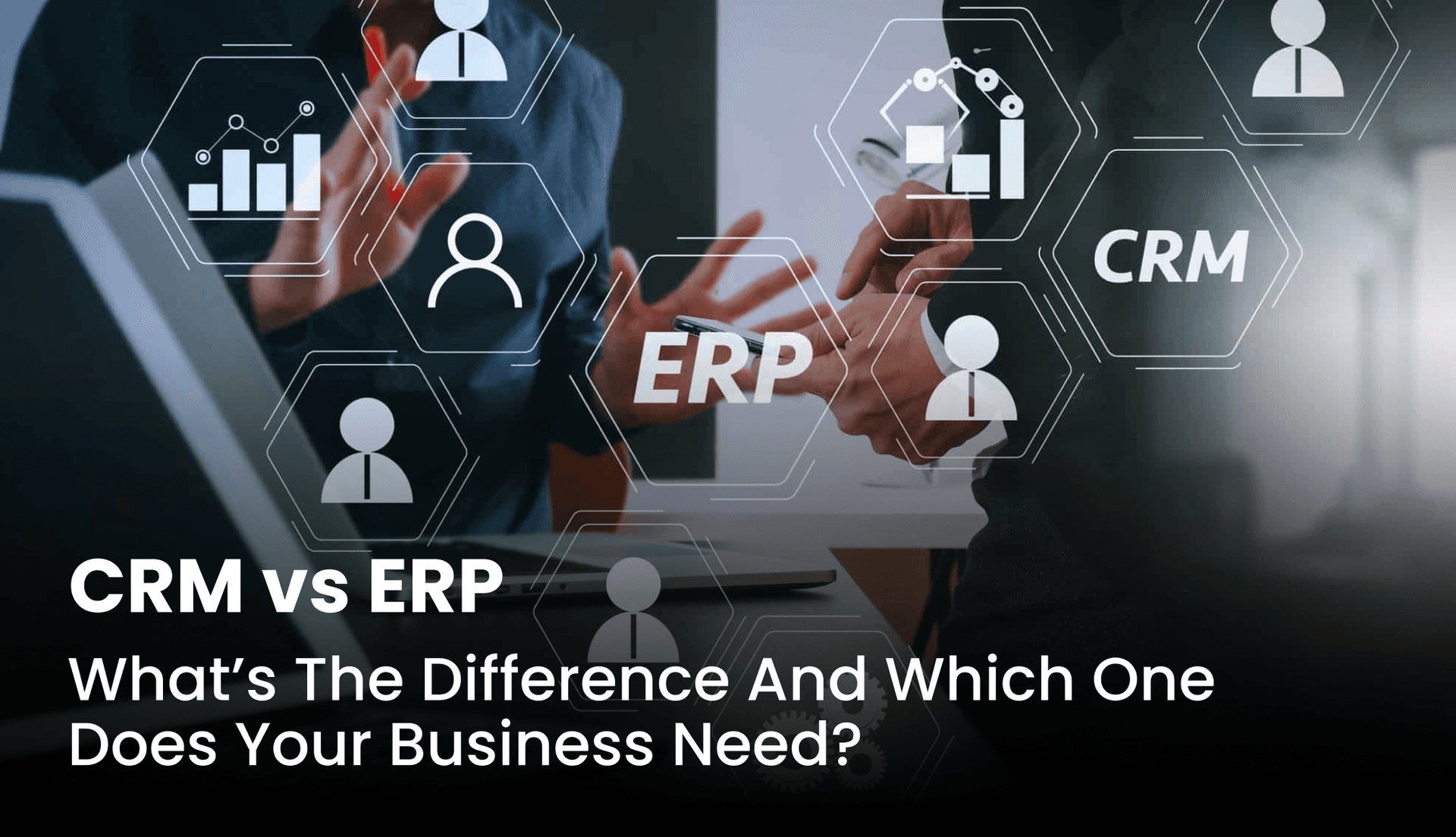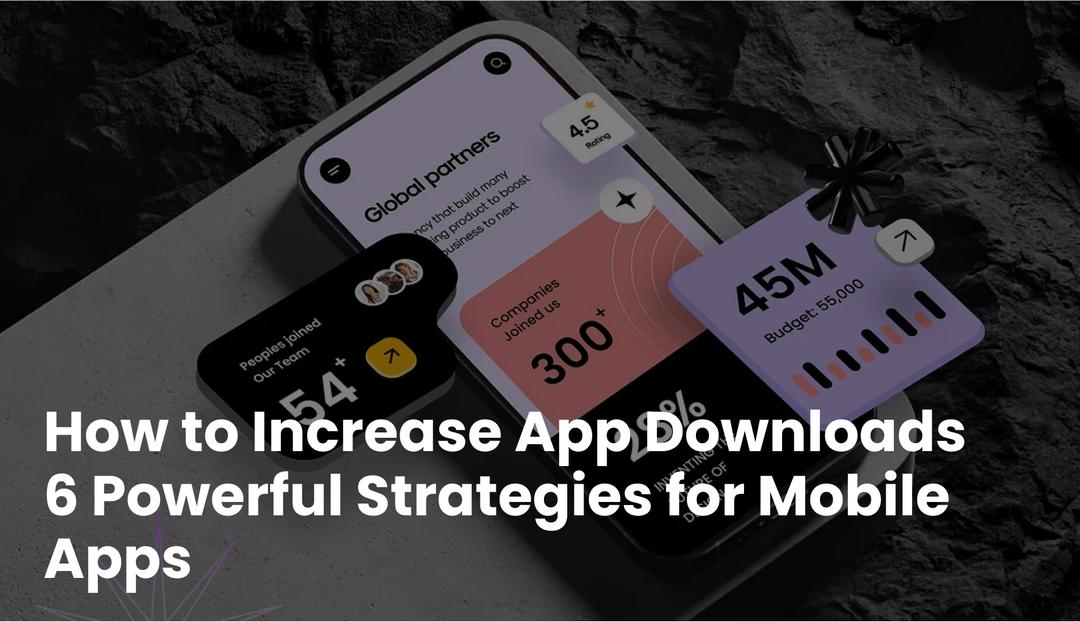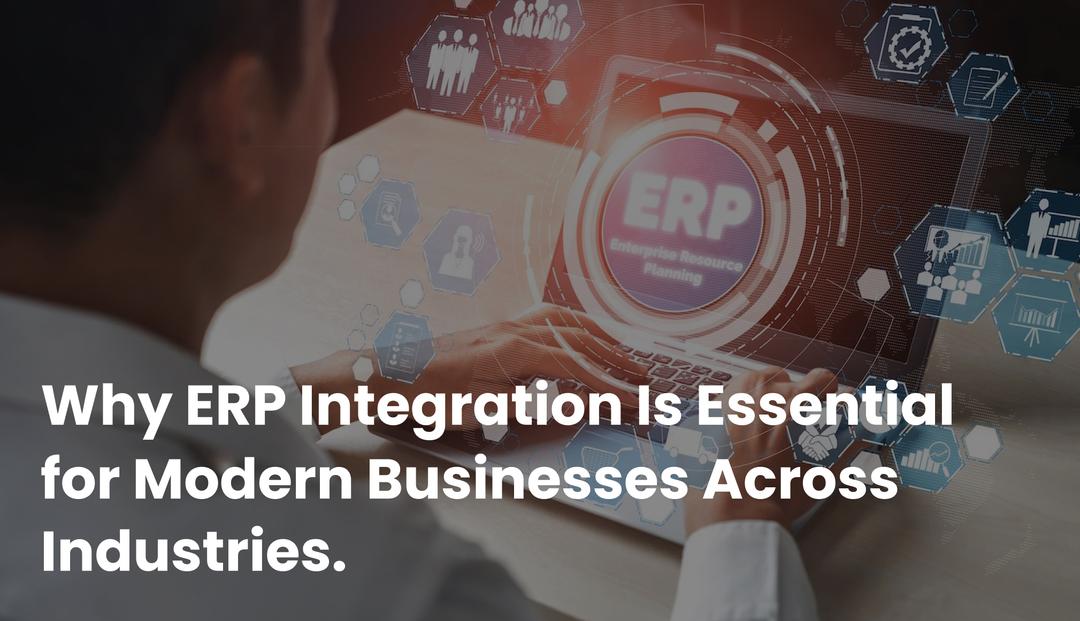When it comes to streamlining operations and improving customer relations, most businesses turn into two major equipment: ERP (Enterprise Resource Planning) and CRM (Customer Relations Management) Systems. While they may look the same on the surface, each business plays a unique role in supporting development. In this blog, we will find out what separates them, how they work, and how to decide which one, or your business really needs.
CRM or ERP – What’s Right for You?
From customers to cash flow, CRM and ERP tackle different challenges. Get the clarity you need to move forward.
Schedule Your Consultation
What is ERP?
Enterprise Resource Planning (ERP) is a comprehensive software system that helps businesses to manage and automate main operations in various departments. From accounting and procurement to project oversight, compliance, supply chain management and resource plan, ERP systems bring all these functions together in an integrated platform. By centralizing data and standardization processes, ERP not only improves efficiency and accuracy, but also supports trade development and scalability.

Benefits of ERP – Full Visibility, Less Chaos
ERP (Enterprise Resource Planning) Software simplifies how businesses manage their day-to-day operations. HR to HR, from inventory to purchase, everything moves through a single platform, eliminates data silos and manual tracking.
One of the biggest benefits of ERP is real -time data access. Instead of waiting for monthly reports or pulling numbers from various departments, decision-makers get immediate, up-to-date insight. This means that leadership can respond rapidly, can quickly adjust strategies, and stay on top of profitability and performance.
Another major benefit? A faster month-end financial close. ERP automates routine processes that usually slow finance teams down, like chasing spreadsheets or gathering info from different departments. What used to take weeks can now take just a few days.
- Stronger internal controls through role-based access to sensitive financial data.
- Accurate, consistent reporting without relying on IT.
- Better forecasting and long-term planning powered by clean, centralized data.
With ERP, businesses don’t just operate they optimize.
What is CRM?
Customer Relationship Management (CRM) software focuses on increasing the way businesses join businesses with both existing and potential customers. This is mainly used to manage contacts by sales, marketing and customer service teams, monitoring interactions and tracking every stage of customer travel. Capture the CRM Tool lead, conducting individual campaigns, solving support issues and making it easy to achieve insight into customer behavior through detailed analysis, all from a centralized database.

Benefits of CRM – Smarter Customer Relationships
A CRM system only does more than storing names and numbers, it is your team’s strategic partner, which is strong, more meaningful customer relationship. With all customer interaction and history stored in a central hub, your sales, marketing and support teams can function more effective and collaboratively.
Instead of jumping between equipment or estimating what the customer needs, your team has real time access to valuable insight. For example, a sales representative, can immediately see if a customer has an unresolved support ticket before walking in the meeting. On the other hand, support agents can give priority to high-value customers, the moment they call, there is no need to ask questions of repetition.
- It helps identify high-potential leads and nurture them effectively.
- Teams can track marketing campaigns, monitor sales performance, and personalize service.
- Everyone from marketing to customer support, has shared visibility, which improves coordination and response time.
Ultimately, a CRM enhances your ability to create a comfortable, consistent and high-value customer experience, leading to better retention and revenue.
Also Read: Best CRM for Your Restaurant Business in 2025
What is the Difference Between CRM and ERP?
Although both CRM and ERP systems are essential to a business, they serve very different purposes, and are typically used by different teams.
ERP (Enterprise Resource Planning) is mainly focused on financial and operational data. It’s the go-to system for back-office tasks like accounting, inventory management, and procurement. It helps the finance team keep everything running smoothly behind the scenes.
CRM (Customer Relationship Management), on the other hand, is all about the front-end of the business. It’s used by sales, marketing, and customer service teams to manage customer relationships, track leads, follow up on sales, and provide better service.
- ERP supports your internal operations – finances, workflows, inventory.
- CRM supports your external relationships – customers, prospects, and how your team interacts with them.
While some ERP platforms may include the underlying CRM features, standalone CRM systems (such as salesforce) usually do not handle financial or transaction processes. For example, salesforce can show you the order history of a customer, but this data usually comes from an integration with ERP – not from within the CRM.
CRM vs. ERP: Feature Comparison Across Business Functions
Both CRM (Customer Relationship Management) and ERP (Enterprise Resource Planning) systems are vital tools for modern businesses. While they serve different core purposes, there’s often some overlap in functionality. Here’s a breakdown of the primary business areas each type of software typically supports:
| ERP Software Focus Areas |
CRM Software Focus Areas |
| Accounting and Financial Management |
Comprehensive Customer View (360-Degree Insights) |
| Human Resources (HR) Management |
Customer Service and Support Tools |
| Inventory Control and Stock Management |
Customer Data and Behavior Analysis |
| Manufacturing and Production Planning |
Bulk Outreach and Communication Tools |
| Procurement and Supplier Management |
Sales Performance and Incentive Tracking |
| Project Planning and Execution |
Marketing Campaign Management |
| Supply Chain Coordination |
Sales Productivity and Enablement Tools |
While ERP systems streamline back-office operations and internal workflows, CRM platforms are designed to improve customer interactions and boost sales and marketing efforts. Choosing the right solution or integrating both, depends on your specific business goals and operational needs.
Integration of CRM and ERP Systems
Integrating CRM and ERP systems is required for growing businesses that want smooth communication between departments and a consistent customer experience. While CRM manages sales, marketing and customer service, ERP handles finance, inventory and other back-office operations. Without integration, teams work in silos, leading to errors and disabilities. When connected, both systems share real-time data-allow the sales representative to look at the payment status of the graduate or allow the finance team to reach CRM data for commission or discount.
A major region where integration adds real value, configures, value, quotes (CPQ) processes, which depends a lot on the accurate data from both CRM and ERP system. While many software vendors provide underlying integration, maintaining these connections can be complicated and expensive during the system upgrade. Nevertheless, alignment of both platforms helps prevent issues such as abandoned orders or revenue discrepancies, while business leaders provide clever forecasts and clean, consistent data for the scheme.
Most importantly, CRM and ERP integration fuels real business growth. This enables teams to move faster, provide more individual customer experience and make better decisions with real -time data. In fact, nucleus research reports that CRMs integrate with internal systems often see a significant increase in productivity and increase up to 30%. For businesses looking to scale efficiently, combining these platforms isn’t just a tech upgrade—it’s a clear competitive advantage.
Also Read:How to Improve Customer Retention with a Custom Business App
Why a Unified CRM and ERP Platform Is the Smarter Choice
As today’s businesses face rising demands for efficiency, agility, and personalization, choosing the right technology becomes more than a convenience, it becomes a competitive edge. While many companies start with ERP to manage financials and internal operations, integrating CRM into that ecosystem is the next smart move. Together, they offer a complete view of your business, from cash flow to customer relationships.
Integration That Moves You Forward
CRM and ERP integration improves accuracy, reduces operational lag, and helps every team stay on the same page with live data sharing.
Get Started Today
A unified CRM and ERP solution eliminates the headaches of juggling separate systems. With real -time data updates, low integration issues and low overall costs, business departments gain more comfortable experience. Whether it is monitoring the customer engagement or optimizing the supply chain performance, an all-in-one platform gives the leaders who need to move fast, serve and make them smarter.
The future belongs to companies that can connect dots between data, departments and decisions. By adopting a solution to unite CRM and ERP, you are not only upgrading software, you are changing ways to out your business from inside.
FAQs










